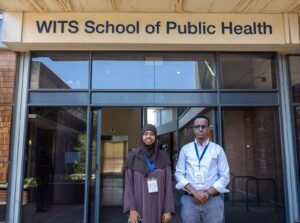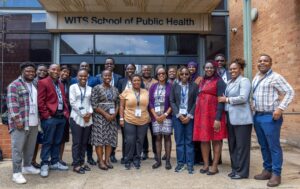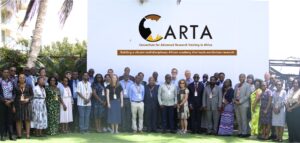Africa’s research and academic landscape has long been shaped by systemic under-investment in institutional infrastructure, limited funding for research, and weak support systems for faculty development. Without strong institutions, efforts to build research capacity remain fragmented and unsustainable.
On the African continent, CARTA stands tall as a model of institutional capacity-strengthening, demonstrating the power of sustained, strategic investment in research institutions. With support from a diverse pool of funders, CARTA has over the last fifteen years invested over USD 50 million in strengthening the capacity of individuals and institutions in Africa.
CARTA’s work spans across eight universities and four research institutions in Africa. The program’s approach is multi-layered, targeting both individuals and institutions. At the individual level, CARTA supports African scholars who are faculty members within partner universities and research institutions. These individuals receive structured PhD and postdoctoral training, mentorship, and nurturing to lead. Their development is not isolated; CARTA embeds this support within institutional systems to ensure long-term sustainability. This is by strengthening research infrastructure, building internal capacities for supervision, training, and research management, and institutionalizing best practices from its proven models into policies and routines. This approach, supporting individuals through strengthened institutions, is cultivating research-enabling environments that can sustain a critical mass of African scholars and drive systemic change.
Strengthening Institutions for Research Transformation
Over 2,000 faculty and staff across partner institutions have benefited from capacity-strengthening initiatives targeting supervisors, academic, professional, and administrative (APAS) staff. These efforts have gone beyond skill acquisition; they have reshaped norms around supervision, mentorship, and graduate support. With cascading models such as Trainer of Trainers (ToT), institutions are now expanding their internal training capacity, ensuring these practices become embedded and self-sustaining. As a result, university departments that once lacked critical research leadership are now home to faculty who lead grant-funded projects, publish in high-impact journals, and mentor the next generation of African researchers.
CARTA’s seed grants, 23 awarded to date, have enabled universities to integrate research training into their systems, adapt doctoral curricula, and support faculty in delivering cutting-edge instruction and supervision. These seed grants have catalyzed institutional reforms, resulting in enhanced institutional agility that outlasts individual projects, ultimately creating space for experimentation and reform at the institutional level, with tangible results. During the COVID-19 pandemic, for example, CARTA supported its partner universities in swiftly transitioning to online learning and extended training modules to ensure continuity. The result was not just resilience in the face of disruption, but long-term institutional agility.
Within the CARTA network, more than eight African institutions have formally integrated CARTA’s interventions, such as doctoral training models, supervision enhancement, and structured grant writing support, into their policies, guidelines, or everyday academic practice. The mainstreaming of CARTA’s approach has delivered tangible benefits, including clearer supervision structures, more rigorous and responsive PhD programs, improved research proposal success rates, and stronger institutional ownership of research training. By adopting institutionalized norms, universities are no longer reliant on external actors to sustain high-quality research training. Instead, they are building internal systems that reinforce accountability, standardize excellence, and ensure continuity and sustainability when individual champions move on or CARTA’s support comes to an end.
Beyond the CARTA partnership, institutions are drawing inspiration and seeking to adopt and adapt CARTA’s interventions in graduate training. For instance, Kwame Nkrumah University of Science and Technology (KNUST) in Ghana has adopted elements of CARTA’s doctoral training model, the Joint Advanced Seminar (JASes). This adoption reflects a growing trust in African-born solutions to African research challenges and reinforces CARTA as a standard-setter for doctoral training on the continent.
Institutional Impact Reflected in Fellows’ Success
One of the clearest demonstrations of what is possible through strategic investment in research capacity is the growing community of scholars trained under CARTA. With institutions better equipped to support doctoral training, CARTA has enrolled 265 PhD fellows (147 women, 118 men) across African universities and research institutions, with 185 having completed their PhDs. CARTA fellows can register either at their home institution or any higher partner university, promoting mobility and cross-institutional exchange. The fellows are not isolated beneficiaries; they are embedded within strengthened institutional systems that support their development and that of the environments in which they operate. Many of them are asserting themselves in positions of leadership and influence in academia, research, and policy, bringing real change and advancing the mission of African-led research and innovation.
Dr. Taofeek O. Awotidebe Adedoyin, a CARTA fellow from Obafemi Awolowo University in Nigeria, is a striking example. During his CARTA-sponsored doctoral studies, he developed a cardio-pulley device aimed at improving heart health for individuals with disabilities. The invention, which emerged from his PhD research in exercise physiology, features a simple yet effective pulley system with a modified braking mechanism that supports upper-body workouts. Affordable, portable, and accessible, the device helps overcome barriers to physical activity often faced by people with musculoskeletal limitations or chronic illness. This innovation reflects the value of investing in systems that empower scholars to respond to local health challenges with homegrown solutions.
Catalyzing Collaborative Innovation
In line with its strategy to strengthen institutional research capacity, CARTA has taken a bold step by awarding seed grants for the establishment of two thematic research hubs. These hubs represent a calculated risk aimed at accelerating research leadership, strengthening institutional identities in specific research niches, and fostering collaboration among early-career researchers. The Emerging and Re-emerging Infectious Diseases (TERID) Hub at Makerere University focuses on pressing health threats such as malaria, tuberculosis, zoonotic infections, and antimicrobial resistance. The second, the DIScovery via CARTA OUtcomes-based Research training and Scientific Excellence (DISCOURSE) Hub, is anchored at the University of the Witwatersrand within the Infectious Diseases and Oncology Research Institute (IDORI). This hub advances research at the intersection of infectious diseases and oncology, addressing the rising burden of non-communicable diseases in Africa.
While both hubs are in their formative stages, they are designed to foster cross-institutional collaboration, promote North–South and South–South partnerships, and facilitate enabling environments that support institutional research leadership. Their success is still to be demonstrated, but they mark CARTA’s willingness to experiment and innovate in pursuit of sustainable, Africa-led research systems.
A vision for the future
CARTA’s investments are redefining what it means to strengthen research capacity in Africa, not through short-term fixes, but through tested, scalable approaches rooted in institutional development. Over the past 15 years, CARTA has supported partner institutions to build strong research systems, deliver structured doctoral training, and nurture early-career researchers into leaders.
As CARTA looks ahead, the challenge is not whether transformation is possible, but deepening and expanding this proven model across more institutions, disciplines, and countries. What began as a training program has evolved into a continent-wide movement to reimagine African research from within. And with every system strengthened, every fellow trained, and every faculty member empowered, CARTA’s vision of a robust, resilient, and locally driven African research landscape comes closer to reality.






No Comments